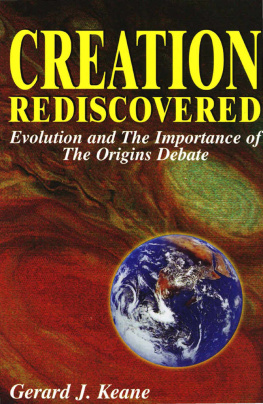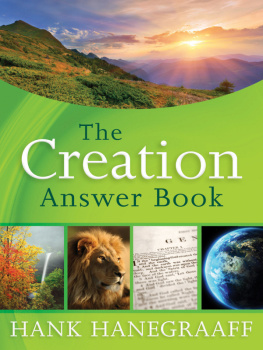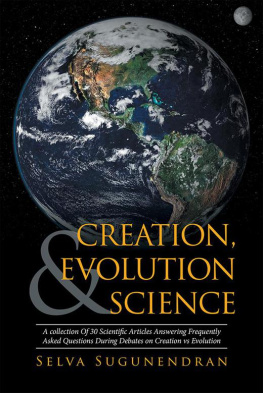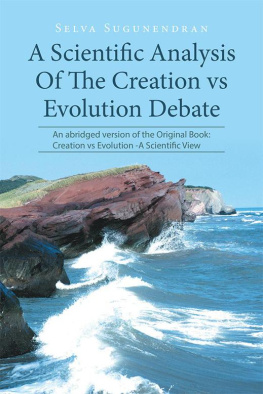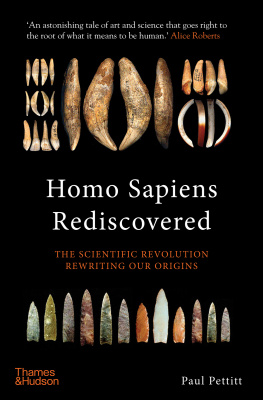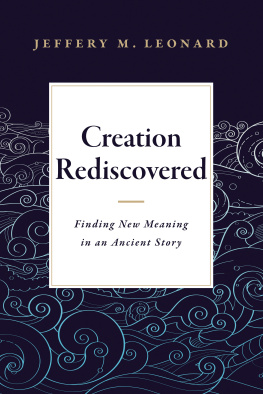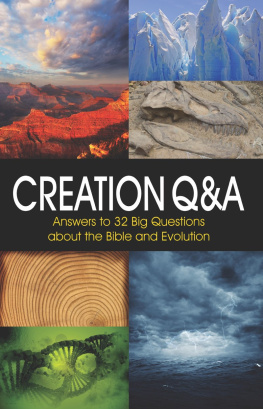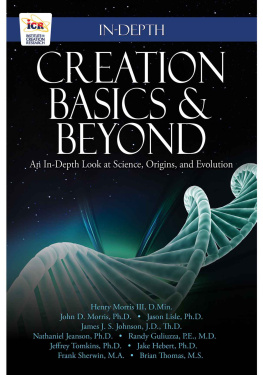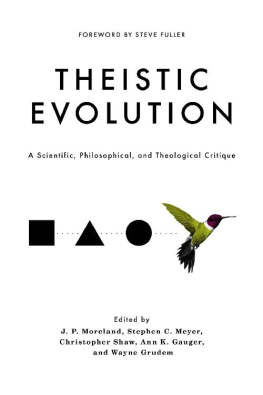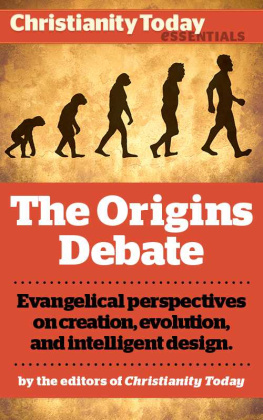Gerard J. Keane - Creation Rediscovered: Evolution and the Importance of the Origins Debate
Here you can read online Gerard J. Keane - Creation Rediscovered: Evolution and the Importance of the Origins Debate full text of the book (entire story) in english for free. Download pdf and epub, get meaning, cover and reviews about this ebook. year: 2015, publisher: TAN Books, genre: Religion. Description of the work, (preface) as well as reviews are available. Best literature library LitArk.com created for fans of good reading and offers a wide selection of genres:
Romance novel
Science fiction
Adventure
Detective
Science
History
Home and family
Prose
Art
Politics
Computer
Non-fiction
Religion
Business
Children
Humor
Choose a favorite category and find really read worthwhile books. Enjoy immersion in the world of imagination, feel the emotions of the characters or learn something new for yourself, make an fascinating discovery.
- Book:Creation Rediscovered: Evolution and the Importance of the Origins Debate
- Author:
- Publisher:TAN Books
- Genre:
- Year:2015
- Rating:4 / 5
- Favourites:Add to favourites
- Your mark:
- 80
- 1
- 2
- 3
- 4
- 5
Creation Rediscovered: Evolution and the Importance of the Origins Debate: summary, description and annotation
We offer to read an annotation, description, summary or preface (depends on what the author of the book "Creation Rediscovered: Evolution and the Importance of the Origins Debate" wrote himself). If you haven't found the necessary information about the book — write in the comments, we will try to find it.
Gerard J. Keane: author's other books
Who wrote Creation Rediscovered: Evolution and the Importance of the Origins Debate? Find out the surname, the name of the author of the book and a list of all author's works by series.
Creation Rediscovered: Evolution and the Importance of the Origins Debate — read online for free the complete book (whole text) full work
Below is the text of the book, divided by pages. System saving the place of the last page read, allows you to conveniently read the book "Creation Rediscovered: Evolution and the Importance of the Origins Debate" online for free, without having to search again every time where you left off. Put a bookmark, and you can go to the page where you finished reading at any time.
Font size:
Interval:
Bookmark:
Evolution and the
Importance of the Origins
Debate
Gerard J. Keane
Copyright 1999 by Gerard J. Keane.
All rights reserved. No part of this book may be reproduced or transmitted in any form or by any means, electronic or mechanical, including photocopying, recording, or by any information storage or retrieval system, without permission in writing from the Publisher, except that brief selections may be quoted or copied without permission, provided full credit is given.
Library of Congress Catalog Card No.: 98-60324
The author may be contacted at:
P. O. Box 451, Doncaster, Victoria 3108, Australia.
TAN BOOKS
Charlotte, North Carolina
1999
ACKNOWLEDGMENTS
To our great Creator and Saviour, without whom nothing is possible.
To my dear wife and children, who had to endure all the inconvenience, but nevertheless helped me to get through the work.
To all those individuals who kindly provided so many incisive comments during the development of the manuscript. I am grateful for all the help given to me; the book could not have been brought together without the insights and wisdom provided by others.

Scripture quotations are taken from the Douay-Rheims Bible , published by TAN Books and Publishers, Inc., Rockford, Illinois.
Paragraph numbers of the English edition of the Catechism of the Catholic Church (1992) are given in parentheses as follows: (400).
CONTENTS
FOREWORD
By Professor Maciej Giertych
Sometime in 1955, when I was taking Honor Moderations in Science (Botany, Chemistry and Geology) at Oxford University, the O. U. Biology Club announced a lecture against the theory of Evolution. The largest auditorium in the Biology Labs was filled to capacity. When the speaker was introduced (I regret I do not remember his name), it turned out he was an octogenarian with a Ph.D. in biology from Cambridge, obtained in the 19th century.
He spoke fervently against the theory of Evolution, defending what was for us an obviously indefensible position. He did not convince anybody with his antique arguments; he did not understand the questions that were fired at him; he rejected science as we knew it. We all had a good laugh hearing this dinosaur. He fought for his convictions against a sophisticated scientific environment, deaf to any opinions inspired by religious beliefs. Today his views are being vindicated by new evidence from natural sciences. May his soul rest in peace.
In 1955, like all in my generation, I was fully convinced that Evolution was an established biological fact. The evidence was primarily paleontological. We were taught how to identify geological strata with the help of fossils, specific for a given epoch. The rocks were dated by the fossils, the fossils by the strata. A lecturer in stratigraphy, when asked during a field trip how the strata were dated, explained that we know the rate of current sedimentation, the depths of strata and thus the age of rocks. In any case, there are new isotopic techniques that confirm all this. This sounded very scientific and convincing.
In my studies I went on to a B.A. and M.A. in forestry, a Ph.D. in plant physiology and finally a D.Sc. in genetics. For a long time I was not bothered by geology, Evolution or any suspicious thoughts. I had my own field of research in population genetics of forest trees, with no immediate relevance to the controversy over Evolution.
Gradually, as my children got to the stage of learning biology in school and discussing their problems with Dad, I realized that the evidence for Evolution had shifted from paleontology and embryology to population genetics. But population genetics is my subject! I knew it was used to explain how Evolution progressed, but I was not aware it is used to prove it. Without my noticing it, my special field had become the supplier of the most pertinent evidence supporting the theory.
If Evolution were proved in some field I was not familiar with, I understood the need to accommodate my field to this fact, to suggest explanations how it occurred in terms of genetics. But to claim that these attempted explanations are the primary evidence for the theory was quite unacceptable to me. I started reading the current literature on the topic of Evolution. Until then I was not aware how shaky the evidence for Evolution was, how much of what was "evidence" had to be discarded, how little new evidence had been accumulated over the years, and how very much ideas dominate facts. These ideas have become dogma, yet they have no footing in natural sciences. They stem from materialistic philosophies.
My primary objection as a geneticist was to the claim that the formation of races, or microevolution, as it is often referred to, is a small scale example of macroevolutionthe origin of species. Race formation is, of course, very well documented. All it requires is isolation of a part of a population. After a few generations, due to natural selection and genetic drift, the isolated population will irreversibly lose some genes, and thus, as long as the isolation continues, in some features it will be different from the population it arose from. In fact, we do this ourselves all the time when breeding, substituting natural with artificial selection and creating artificial barriers to generative mixing outside the domesticated conditions.
The important thing to remember here is that a race is genetically impoverished relative to the whole population. It has fewer alleles (forms of genes). Some of them are arranged into special, interesting, rare combinations. This is particularly achieved by guided recombination of selected forms in breeding work. But these selected forms are less variable (less polymorphic). Thus what is referred to as micro-evolution represents natural or artificial reduction of the gene pool. You will not get Evolution that way. Evolution means construction of new genes. It means increase in the amount of genetic information, and not reduction of it.
The evolutionary value of new races or selected forms should be demonstrable by natural selection. However, if allowed to mix with the general breeding population, new races will disappear. The genes in select combinations will disperse again; the domesticated forms will go wild. Thus there is no evidence for Evolution here.
Mutations figure prominently in the Evolution story. When in the early '60s I was starting breeding work on forest trees, everyone was very excited about the potential of artificial mutations. In many places around the world, special "cobalt bomb" centers were established to stimulate rates of mutations. What wonderful things were expected from increased variability by induced mutations. All of this work has long since been abandoned. It led nowhere. All that was obtained were deformed freaks, absolutely useless in forestry.
Maybe occasionally some oddity could be of ornamental value, but never able to live on its own in natural conditions. A glance through literature on mutations outside forestry quickly convinced me that the pattern is similar everywhere. Mutations are either neutral or detrimental. Positive ones, if they do occur, are too rare to be noticeable. Stability in nature is the rule. We have no proofs for Evolution from mutation research.
It is sometimes claimed that strains of diseases resistant to antibiotics, or weeds resistant to herbicides, are evidence for positive mutations. This is not so. Most of the time, the acquired resistance is due to genetic recombination and not due to mutations. Where mutations have been shown to be involved, their role depends on deforming part of the genetic code, which results in a deformed, usually less effective protein that is no longer suitable for attachment by the harmful chemical.
Next pageFont size:
Interval:
Bookmark:
Similar books «Creation Rediscovered: Evolution and the Importance of the Origins Debate»
Look at similar books to Creation Rediscovered: Evolution and the Importance of the Origins Debate. We have selected literature similar in name and meaning in the hope of providing readers with more options to find new, interesting, not yet read works.
Discussion, reviews of the book Creation Rediscovered: Evolution and the Importance of the Origins Debate and just readers' own opinions. Leave your comments, write what you think about the work, its meaning or the main characters. Specify what exactly you liked and what you didn't like, and why you think so.

